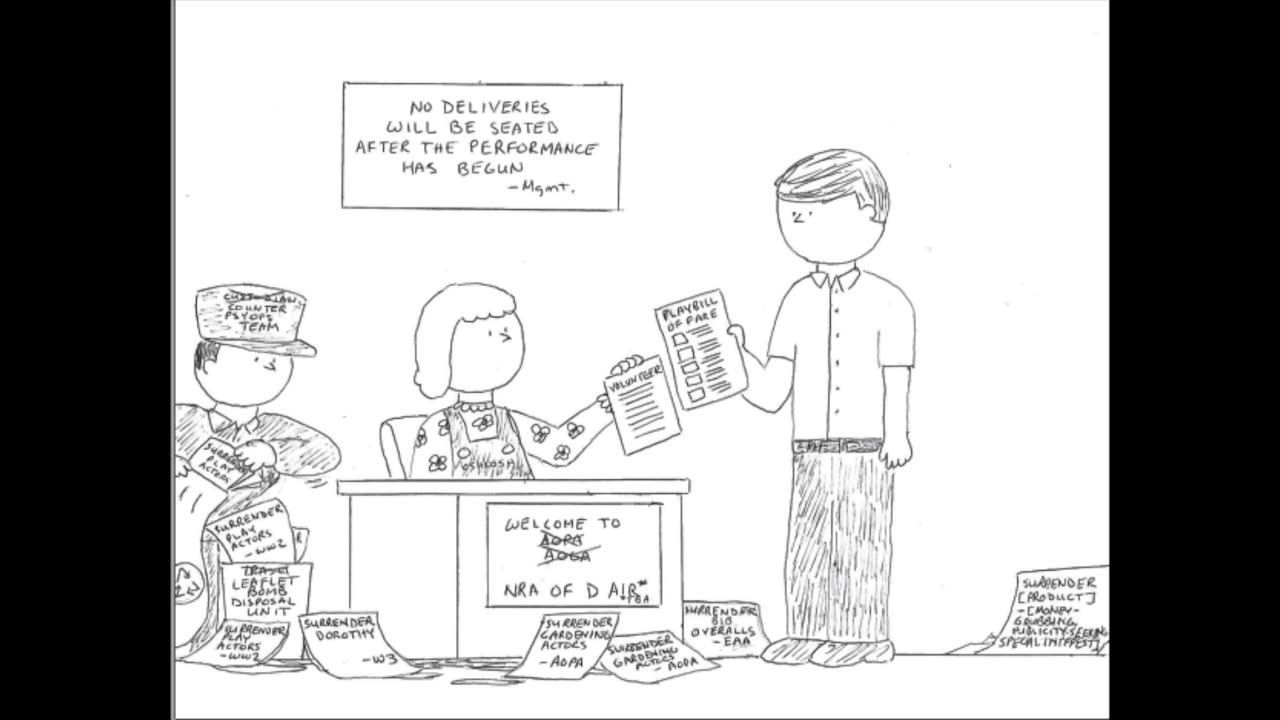Premium Only Content

Direct And Produce
Mrs. Detering: “WW2 effectively threatened to injunction us into a smoking hole, hang us as war criminals and haul what’s left of our charred bodies before a cadaver synod chaired by His Holiness Pope FDR the First, Second, Third and Fourth unless we changed our name.” -
The Cadaver Synod was an ecclesiastical trial held in Rome in January, 897 AD. Conducted by Pope Stephen VI, the defendant was the late Pope Formosus, who had been dead for about seven months. Stephen VI had Formosus's corpse exhumed from his tomb in St. Peter’s Basilica and brought to the papal court at the Basilica San Giovanni Laterano for judgment. Formosus was dressed in papal robes and propped up in a chair. A deacon answered on His Late Holiness’s behalf (well, Pope Stephen VI may have been a lunatic, but at least he believed in the right of the accused to a speedy trial and a court-appointed attorney).
Stephen VI accused Formosus of perjury, of having seeking the papacy and illegally presiding as a bishop over two dioceses. At the end of the trial, Formosus was pronounced guilty. Formosus’s papacy was retroactively declared null, three fingers on his right hand were chopped off and he was buried in an unmarked grave. Stephen VI later returned to Formosus’s grave, dug him up and dumped his body in the Tiber River. Stephen VI was later thrown into prison by an angry mob and was found one day strangled in his cell. Formosus’s body was fished out of the river by Pope Theodore, and Pope John IX oversaw Formosus’s reinterment at St Peter’s Basilica.
Mrs. Detering: “How else would you explain the court-packing plan of 1937, the National Recovery Administration and the ‘generous relocation packages’ he offered to over 130,000 German, Italian, and Japanese-Americans?” –
Fed up with the Supreme Court striking down his New Deal legislation as unconstitutional, FDR proposed the Judicial Procedures Reform Bill of 1937 (colloquially referred to as the “Court Packing Plan”), which was his attempt to break the Supreme Court by packing it with New Deal friendly justices. In the creation of the bill, FDR argued that there is nothing in the Constitution that stated that there must be nine justices (one Chief Justice and eight Associate Justices). That much is true, that number was set by the Judiciary Act of 1869. The Judicial Procedures Reform Bill stated that for every justice that passed the age of 70 and failed to retire, a new justice must be appointed. FDR’s own party revolted against the bill, and it ultimately failed.
The National Recovery Administration was FDR’s New Deal agency which intended to bring industry, labor, and government together to create codes of "fair practices" and set prices. Instead, the NRA became a bloated bureaucracy and a breeding ground for cartels which shut out small businesses, fostered brutal crackdowns by enforcement police for trivial transgressions, and encouraged the formation of black markets. Any businesses who chose not to join the NRA were boycotted. In 1935, the U.S. Supreme Court unanimously declared that the NRA law was unconstitutional, ruling that it infringed upon the separation of powers under the United States Constitution.
The unjust incarceration of tens of thousands of Japanese-Americans during World War II (influenced no doubt by FDR’s deep-rooted racist beliefs against the Japanese) is well-documented (see Executive Order 9066), but little is said about the shoddy treatment of thousands of Italian-Americans and German-Americans (see Presidential Proclamation 2526 and the Alien and Sedition Act of 1798). While the Japanese-Americans and Italian-Americans received an apology for their internment, the German-Americans don’t appear to have received theirs yet. The Wartime Treatment Study Act of 2007 had hoped to change that. Senator Jeff Sessions of Alabama opposed the bill based on comments from a senior historian for the U.S. Holocaust Memorial Museum, who argued that the bill's identical depiction of the treatment of Axis citizens and European Americans was 'outrageously exaggerated."' Stories from German-American interns tell a different story. They tell of 17 year old boys arrested at their high schools, men who were forced to shutter their businesses and of individuals who were held in internment camps until 1947, two years after the war ended. The bill passed the Senate, but failed to pass the House and therefore failed to become law. It is rather unfortunate that this “historian,” who is supposed to objectively analyze the history of these concentration camps and make assessments based on those findings, apparently chose instead to cave in to his biases and his bosses by letting them dictate what mistreatment is and what it isn’t.
Man: “Oh, okay. Let’s see. Then it looks like you follow up with ‘All Quiet on the Western Front’ then you finish the season with ‘The Cherry Orchard?’ I don’t understand, Ms. Detering.” -
Besides the reason Mrs. Detering gave, there is another significance of placing “All Quiet on the Western Front” before “The Cherry Orchard.” In chapter 11 of “All Quiet on the Western Front,” Detering, a farmer before he joined the war, was returning from the front line when he saw a cherry tree in a garden. Later that evening, he left his billet without permission, and came back with a couple of branches of cherry blossoms in his hand. “I have a big orchard with cherry trees at home. When they are in blossom, from the hay loft they look like one single sheet, so white. It is just the time.”
Two days later, Detering deserted. He was captured by the military police attempting to run back to Germany. Detering was court-martialed, and very likely executed.
Mrs. Detering: “Our season sponsor is also predicting a rather chilly winter. So we put ‘All Quiet on the Western Front’ in this season so that when we strike the set, we’ll simply pull the cherry trees from Mamochka’s nursery and plop them into the trenches and the artillery craters.” - The opening scene of Chekhov’s “The Cherry Orchard” (1904) takes place in a room called “the nursery.”
Mrs. Detering: “The backdrop should be in blossom just in time for Chekhov’s classic comedy about a spendthrift family locking their 87 year old hearing impaired manservant inside an abandoned house.” – A reference to the last scene in Anton Chekhov’s “The Cherry Orchard.” Chekhov calls “The Cherry Orchard” “A Comedy in Four Acts.” He also called “The Seagull” (1896) “A Comedy in Four Acts.” “The Seagull” ends with Treplyov shooting himself (it was actually Treplyov’s second attempt to commit suicide). Early on in his career, under a pseudonym, Chekhov was a contributor to Russian humorous magazines, writing jokes and comedy sketches. No wonder he never succeeded in that venture.
As a side note, on page 288 of the Extra Material section of “Plays: Anton Chekhov” (Alma Classics edition, 2018), it states that by 1884, Chekhov had published over 300 works and “Most of the stories were already, in a very understated way, depicting life’s ‘losers’ – such as the idle gentry, shopkeepers striving to unsuccessfully to make a living and ignorant peasants.” After having read that sentence, we here at CoBaD can see now that Chekhov’s most famous late works “The Seagull” (1896), “Uncle Vanya” (1899) “Three Sisters” (1901) and “The Cherry Orchard” (1904) are indeed, broadly speaking, very formulaic and predictable, using the "losers" theme over and over again.
Man: “Oh, very clever. No one would ever mistake AOPA with the NRA OF D AIR…well, outside of Washington, anyway…” – AOPA, the Aircraft Owners and Pilots Association, an advocate for general aviation, is sometimes referred to in political circles as “The NRA (National Rifle Association) of the air” because its lobbying tentacles are as extensive as the NRA’s, reaching into every nook, cranny, crack, crevasse, pocket, war chest and ear in DC.
Mrs. Detering: “I can see you’re just the man for our agricultural ops force.” - Indirect reference to Code of Federal Regulations Title 14, Part 137, “Agricultural Aircraft Operations,” commonly referred to as “crop dusting.”
References:
Harper, E. Atlas Obscura. The Cadaver Synod: When a Pope’s Corpse Was Put On Trial. 03 March 2014. https://www.atlasobscura.com/articles/morbid-monday-cadaver-synod
CBS News. “WWII: U.S. Germans were ‘Enemy Aliens.’” 09 June 2007. https://www.cbsnews.com/news/wwii-us-germans-were-enemy-aliens/
Chekhov, A. (2018) Plays: Anton Chekhov. Translated by Hugh Aplin. Alma Classics, Surrey, U.K.
National Archives and Records Administration. (2023, December). Code of Federal Regulations. https://www.ecfr.gov/current/title-14/chapter-I/subchapter-G/part-137
Remarque, E. M. (2013) All Quiet on the Western Front. Translated by A.W. Wheen. Random House.
Wikipedia. Alien and Sedition Act. https://en.wikipedia.org/wiki/Alien_and_Sedition_Acts
Wikipedia. Cadaver Synod. https://en.wikipedia.org/wiki/Cadaver_Synod
Wikipedia. Executive Order 9066. https://en.wikipedia.org/wiki/Executive_Order_9066
Wikipedia. Internment of German-Americans. https://en.wikipedia.org/wiki/Internment_of_German_Americans
Wikipedia. Internment of Italian-Americans. https://en.wikipedia.org/wiki/Internment_of_Italian_Americans
Wikipedia. Internment of Japanese-Americans. https://en.wikipedia.org/wiki/Internment_of_Japanese_Americans
Wikipedia. Judicial Procedures Reform Bill of 1937. https://en.wikipedia.org/wiki/Judicial_Procedures_Reform_Bill_of_1937
Wikipedia. The National Recovery Administration. https://en.wikipedia.org/wiki/National_Recovery_Administration
-
 LIVE
LIVE
Total Horse Channel
1 day ago2025 Scottsdale Arabian Horse Show | Saturday Evening Session
6,792 watching -
 22:39
22:39
The Mel K Show
1 hour agoMel K & Representative Brandon Gill | Our Constitutional Republic is Being Restored | 4-26-25
8.95K9 -
 8:52
8:52
Tundra Tactical
3 hours ago $4.82 earnedSCOTUS Denies Appeal, Minnesota Courts Deal 2a Win!
9.63K7 -
 22:27
22:27
Exploring With Nug
12 hours ago $9.26 earnedSwamp Yields a Chilling Discovery in 40-Year Search for Missing Man!
24.5K12 -
 1:23:26
1:23:26
RiftTV/Slightly Offensive
6 hours ago $8.48 earnedThe LUCRATIVE Side of Programming and the SECRETS of the "Tech Right" | Guest: Hunter Isaacson
39.3K16 -
 LIVE
LIVE
a12cat34dog
5 hours agoONE WITH THE DARK & SHADOWS :: The Elder Scrolls IV: Oblivion Remastered :: FIRST-TIME PLAYING {18+}
197 watching -
 27:57
27:57
MYLUNCHBREAK CHANNEL PAGE
1 day agoDams Destroyed India
50.7K18 -
 LIVE
LIVE
Phyxicx
7 hours agoLast minute practice before Sunday - 4/26/2025
243 watching -
 LIVE
LIVE
The Official Steve Harvey
10 days ago $4.35 earned24 HOURS OF MOTIVATION w/ STEVE HARVEY
74 watching -
![Nintendo Switch It UP Saturdays with The Fellas: LIVE - Episode #16 [Clue]](https://1a-1791.com/video/fww1/eb/s8/1/L/3/n/F/L3nFy.0kob-small-Nintendo-Switch-It-UP-Satur.jpg) LIVE
LIVE
MoFio23!
12 hours agoNintendo Switch It UP Saturdays with The Fellas: LIVE - Episode #16 [Clue]
123 watching